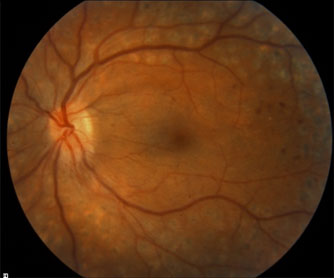New Treatment for Macular holes
Recent approval of Jetrea (Ocriplasmin) to treat symptomatic VMA (Vitreo Macular Adhesion) has opened up a new era in non surgical management of macular holes. Previously only a hospital based surgery was able to reverse the process of macular hole development but now a new drug can be injected into the eye painlessly in the office and within a few weeks the process reverses back to more normal vision levels.... more
FDA Approves ASRS Leader's ArgusŪ II Artificial Retina
On February 14, the FDA approved the Argus II artificial retina developed by ASRS Executive Committee and Board Member Mark S. Humayun, MD, PhD.
This breakthrough technology is the first ever to offer limited vision to patients with late-stage retinitis pigmentosa (RP).
Second Sight Medical Products (Sylmar, CA) manufactures the Argus II implant, which has 60 electrodes and a tiny camera mounted on eyeglasses to capture images.
The FDA approved Argus II for adults age 25 years or older with severe to profound RP. About 10,000 to 15,000 of the 100,000 Americans with RP will qualify for Argus II. Up to 4,000 patients a year can be treated with the device.
Macular degeneration and Aspirin?

Aspirin and Macular degeneration... is there an increase in the wet form of macular degeneration in those patients taking aspirin? The wet form develops quicker than the dry form. It may only be related to the fact that you are more likely to take aspirin if you have medical problems like stroke or heart attacks in the past and these conditions are more commonly associated with wet age related macular degeneration. ... more

Vitreous Hemorrhage

Overview:
A sudden retina tear or bleeding aneurysm or complication from another eye disease can cause a hemorrhage in the vitreous of the eye, causing the vision to become blurred. Vessels that are subject to hemorrhaging are often those that have been weakened due to hypertensive retinopathy or diabetic retinopathy. Vitreous hemorrhages in non diabetic patients are most likely caused by retinal tears and this can progress rapidly to retinal detachment.
Symptoms & Types:
Vitreous hemorrhage symptoms usually involve suddenly blurred vision, and can include visualizing “flashes” of light or “floaters” of strings, blobs or dots.
Treatments:
Some minor vitreous hemorrhages have the ability to heal on their own, but others require surgical procedures, like a vitrectomy. All new vitreous hemorrhages need a fully dilated eye exam to see if a retinal tear can be found and treated immediately. Diabetic vitreous hemorrhages probably mean that the patient is no longer “Background” and has now become proliferative. This carries a very poor prognosis and needs evaluation and treatment soon.
During a vitrectomy, the surgeon uses an instrument to remove the liquid vitreous from the eye, thereby removing the hemorrhage with it; then replaces the liquid with a saline solution similar to what was removed. Laser treatment is frequently used to stop further bleeding or detachments and is applied in surgery. Although vision can potentially improve depending on the severity of the hemorrhage, recovery takes weeks.
Prevention:
Because vitreous hemorrhages are largely caused by retina tears or ruptured vessels made weak by high blood pressure and diabetes, it is imperative to maintain these health concerns and get exams as soon as possible.
If you are diabetic, check sugar on a regular basis and record the results; maintain a blood sugar level between 80 and 110 (just before meals). If you have high blood pressure, try to keep your readings down to 130/85 or better.
On a dietary level, avoid sodas and carbonated beverages, keep away from foods high in sugar, animal fats, and cholesterol, and maintain a healthy weight through regular exercise. If possible, seek the advice of a registered dietician. Above all discuss control issues with your physician as diet, medicines and exercise have to be balanced properly to avoid high and low blood sugars. Even and normal blood sugars and normal blood pressures gives the least eye problems. Read more on diabetic diet.






